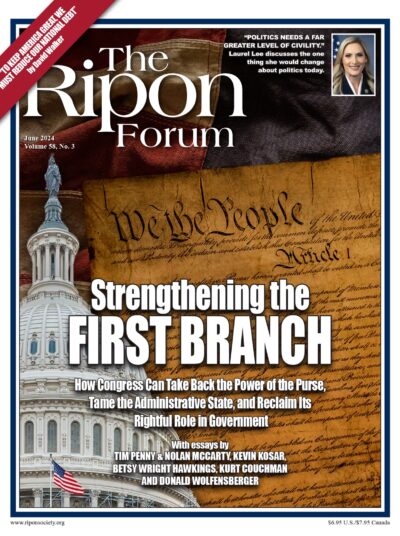
The House Rules Committee has often been called, “The Speaker’s Committee.” That’s because it is the chief scheduling arm of the majority leadership for clearing major legislation for House floor consideration. It devises special rules to give important bills priority floor status and establish the terms for their debate and amendment.
However, the moniker of “Speaker’s committee” has lost some of its stature and respect in the current Congress. Seven special rules have been defeated by the House, meaning at least some Republicans have joined with Democrats in blocking the bills scheduled for floor consideration that week.
Moreover, on one occasion, three of the nine Republican members of the committee stood firm in committee opposing a special rule for a border bill the Speaker had asked for. Their opposition forced the Speaker to instead offer four bills relating to international security and humanitarian assistance to Ukraine, Israel and Taiwan and appeal for Democratic votes to carry the rule and measures it made in order.
On other occasions the Speaker has scheduled must-pass bills under “suspension of the rules” to bypass the Rules Committee, counting on Democratic support to achieve the two-thirds vote required under that process.
Seven special rules have been defeated by the House, meaning at least some Republicans have joined with Democrats in blocking the bills scheduled for floor consideration that week.
Is this the new normal? Has the Speaker, as some of his GOP critics charge, transformed the House into a uniparty institution in which only bipartisan legislation can be considered and passed?
Many veteran observers think that is not the case, and that the unique situations cited above are simply one-offs – that the House has and will continue to return to majority party rule as before. The House Rules Committee will continue to matter, they say, as the pivot point and wheelhouse in facilitating the leadership’s legislative agenda.
To get a better grasp on where the Rules Committee began and where it’s been, it’s helpful to review a brief history of its 225-year existence. The committee is the oldest committee in the House. It was born on April 2, 1789, as a select committee of the First Congress to recommend a set of rules by which the House could operate. It continued to exist for the next 90 years as a select committee to recommend any changes in the rules. In 1858, the Speaker became a member of the committee, and the next year, he became its chairman.
Finally, in 1880, the House made it a permanent standing committee, with the Speaker still at the helm. In 1889-90, Congressman Thomas Brackett Reed (R-Maine) was elected Speaker, and thereby the Rules Committee chairman. He transformed the committee and the House dramatically. As Speaker (and a Progressive Republican), he issued rulings from the chair to break up obstructive tactics by the Democrats, such as the “disappearing quorum,” in order to permit the consideration of major bills. He would then go to the Rules Committee as its chairman to ensure those rulings were enshrined in the standing rules of the House.
His other major innovation was using the Rules Committee as a scheduling mechanism through the use of special rules, also known as “order of business resolutions.” Not only did they enable the leadership to elevate bills that were at the bottom of the calendar to privileged status on the floor, but they allocated debate time and the amendment process. The special rules could also waive any standing rules that might be in the way and even “self-execute” the adoption of amendments or pass entire measures on the nod by their language. As minority party detractors would sometimes charge, it was really the “Unruly Committee” because its tactics and procedural gymnastics went against the grain of what was thought to be the regular order of the rules process.
Is this the new normal? Has the Speaker, as some of his GOP critics charge, transformed the House into a uniparty institution in which only bipartisan legislation can be considered and passed?
Speaker Reed’s Republican successor as Speaker and Rules Committee chair was “Uncle Joe” Cannon of Illinois – a conservative stalwart compared to Reed’s progressive bent. Cannon didn’t think any new legislation was needed since “everything’s just fine back in Danville,” his home town in Illinois. After a decade as chair, he succumbed to a bipartisan coup in 1910 by Democrats and liberal Republicans that removed him as chair and member of the Rules Committee. He then entertained a motion to remove him as Speaker, and a Democrat obliged. But Cannon’s Republican colleagues stuck by him on that vote.
Republicans lost control of the House anyway in the 1910 elections. The new Democratic majority increased the Rules Committee’s size from five to 12 members – eight majority and four minority. And they turned to their majority caucus (not the Speaker), for decisions on legislative procedures and priorities.
In the mid-20th Century, a conservative coalition of southern Democrats and Republicans became a dominant ruling group in the House. On the Rules Committee, two southern Democrats, “Judge” Howard Smith of Virginia and Bill Colmer of Mississippi, would join with the four Republicans to sometimes block, by 6-6 tie votes, important legislation like civil rights bills.
With the sorting of the parties in the late 1960s and 70s, and the congressional reform revolution of the latter decade, the House and Rules Committee returned to a moderate ruling majority.
Even with the Republican House takeover in 1995, the parties’ roles were well defined. They simply exchanged playbooks whenever majority control flipped. But the Rules Committee remains at the center of the action. It has demonstrated over two centuries that it adapts to a changing House, just as the House has done to it. It still matters.
Donald R. Wolfensberger is a Congress Scholar at the Wilson Center and previously directed its Congress Project from 1999-2012. He is author of “Congress and the People: Deliberative Democracy on Trial” (2000) and “Changing Cultures in Congress: From Fair Play to Power Plays” (2018). He previously served as a staff member in the U.S. House of Representatives (1969-1997), rising to the position of Chief of Staff of the House Rules Committee.




